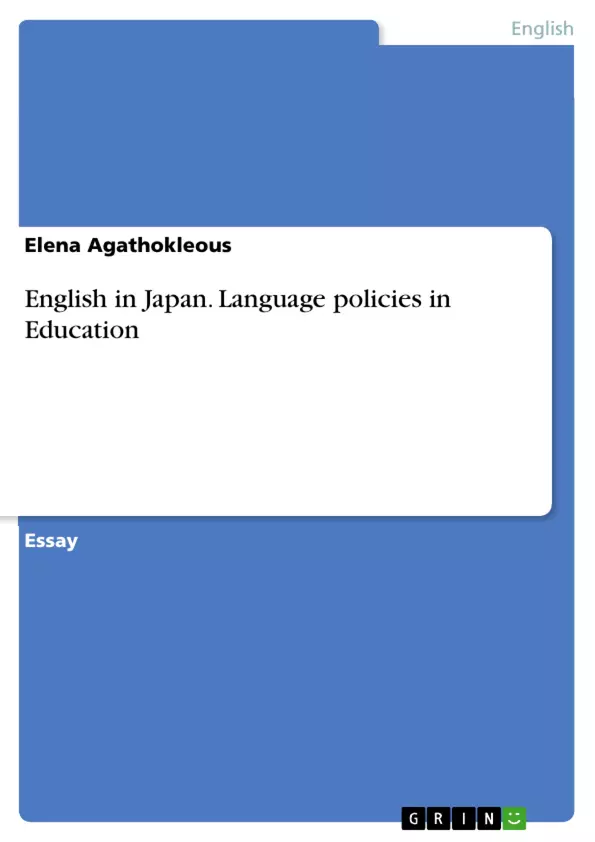The paper deals with the English language in Japan, specifically language policies in education. English has become the language through which the citizens of the globalized community of our world communicate and collaborate. The ability for a person to be able to use the English language to communicate with others is now more important than ever even in countries like Japan which in the past had no significant amount of tourists or immigrants and a rather local mentality of businesses so there was no great need for these people to be proficient in English.
Inhaltsverzeichnis (Table of Contents)
- English in Japan: Language Policies in Education
- The Government's Response to Low Proficiency in English
- The 2002 Strategic Plan
- The 2003 Action Plan
- Evaluation of the Action Plan
Zielsetzung und Themenschwerpunkte (Objectives and Key Themes)
This text provides a detailed analysis of the government's language policies in education in Japan, focusing on the period from 2002 onwards. It aims to examine the reasons behind the government's initiatives to enhance English language proficiency among Japanese citizens, the specific measures implemented through the Strategic Plan and the Action Plan, and the impact and effectiveness of these policies.
- The growing need for English proficiency in a globalized world
- The historical development of English language education in Japan
- The key features and objectives of the Strategic Plan and Action Plan
- The role of teachers and schools in promoting English language learning
- The effectiveness of government policies in improving English proficiency
Zusammenfassung der Kapitel (Chapter Summaries)
- English in Japan: Language Policies in Education: This chapter sets the stage for the discussion by outlining the historical context and the increasing importance of English proficiency in Japan due to globalization, increased tourism, and international business relations.
- The Government's Response to Low Proficiency in English: This chapter explores the government's realization of Japan's low English proficiency and the subsequent decision to implement measures to improve language learning and teaching in the country.
- The 2002 Strategic Plan: This chapter delves into the details of the Strategic Plan, highlighting its objectives, key features, and focus on cultivating "Japanese with English Abilities" by promoting communication skills and enhancing the teaching system.
- The 2003 Action Plan: This chapter examines the Action Plan as a continuation of the Strategic Plan, providing practical steps to achieve the goals outlined in the previous plan. It outlines measures targeting schools, students, and teachers, as well as the promotion of English activities in elementary schools.
- Evaluation of the Action Plan: This chapter evaluates the impact of the Action Plan, analyzing research findings and highlighting both the successes and the areas for improvement in English language education in Japan.
Schlüsselwörter (Keywords)
This text focuses on key terms and concepts related to English language policies in education in Japan, including government initiatives, strategic plans, action plans, teacher training, student motivation, proficiency levels, and the grammar-translation method of teaching. It explores the impact of these policies on the development of English proficiency in Japan, highlighting the importance of language learning for individual and national success in a globalized world.
Frequently Asked Questions
What are the main English language policies in Japan?
The Japanese government implemented the 2002 Strategic Plan and the 2003 Action Plan to cultivate "Japanese with English Abilities" to meet the challenges of globalization.
Why did Japan feel the need to improve English proficiency?
Increasing globalization, international business relations, and a rise in tourism made English communication skills essential for national success.
What was the 2003 Action Plan about?
It was a continuation of the 2002 plan, providing practical steps to improve teaching systems, teacher training, and English activities in elementary schools.
What is the "grammar-translation method"?
It is a traditional teaching method often criticized for focusing on reading and writing rather than practical oral communication skills.
How effective have these government policies been?
The paper evaluates the impact, noting successes in teacher training but also highlighting ongoing challenges in student motivation and actual proficiency levels.
- Citation du texte
- Elena Agathokleous (Auteur), 2019, English in Japan. Language policies in Education, Munich, GRIN Verlag, https://www.grin.com/document/995911



